Mutant IDH inhibits HNF-4α to block hepatocyte differentiation and promote biliary cancer
- PMID: 25043045
- PMCID: PMC4499230
- DOI: 10.1038/nature13441
Mutant IDH inhibits HNF-4α to block hepatocyte differentiation and promote biliary cancer
Erratum in
-
Corrigendum: Mutant IDH inhibits HNF-4α to block hepatocyte differentiation and promote biliary cancer.Nature. 2015 Dec 3;528(7580):152. doi: 10.1038/nature16136. Epub 2015 Nov 18. Nature. 2015. PMID: 26580013 No abstract available.
Abstract
Mutations in isocitrate dehydrogenase 1 (IDH1) and IDH2 are among the most common genetic alterations in intrahepatic cholangiocarcinoma (IHCC), a deadly liver cancer. Mutant IDH proteins in IHCC and other malignancies acquire an abnormal enzymatic activity allowing them to convert α-ketoglutarate (αKG) to 2-hydroxyglutarate (2HG), which inhibits the activity of multiple αKG-dependent dioxygenases, and results in alterations in cell differentiation, survival, and extracellular matrix maturation. However, the molecular pathways by which IDH mutations lead to tumour formation remain unclear. Here we show that mutant IDH blocks liver progenitor cells from undergoing hepatocyte differentiation through the production of 2HG and suppression of HNF-4α, a master regulator of hepatocyte identity and quiescence. Correspondingly, genetically engineered mouse models expressing mutant IDH in the adult liver show an aberrant response to hepatic injury, characterized by HNF-4α silencing, impaired hepatocyte differentiation, and markedly elevated levels of cell proliferation. Moreover, IDH and Kras mutations, genetic alterations that co-exist in a subset of human IHCCs, cooperate to drive the expansion of liver progenitor cells, development of premalignant biliary lesions, and progression to metastatic IHCC. These studies provide a functional link between IDH mutations, hepatic cell fate, and IHCC pathogenesis, and present a novel genetically engineered mouse model of IDH-driven malignancy.
Figures

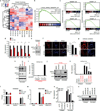

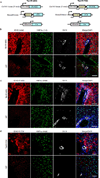
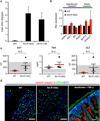
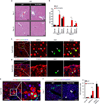





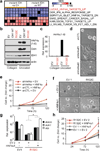


Comment in
-
HNF-4α-mediated hepatocyte differentiation is blocked by mutant IDH.Cancer Discov. 2014 Sep;4(9):OF9. doi: 10.1158/2159-8290.CD-RW2014-151. Epub 2014 Jul 17. Cancer Discov. 2014. PMID: 25185208
References
-
- Voss JS, et al. Molecular profiling of cholangiocarcinoma shows potential for targeted therapy treatment decisions. Hum Pathol. 2013;44:1216–1222. - PubMed
METHODS REFERENCES
-
- Postic C, Magnuson MA. DNA excision in liver by an albumin-Cre transgene occurs progressively with age. Genesis. 2000;26:149–150. - PubMed
-
- Beard C, Hochedlinger K, Plath K, Wutz A, Jaenisch R. Efficient method to generate single-copy transgenic mice by site-specific integration in embryonic stem cells. Genesis. 2006;44:23–28. - PubMed
EXTENDED DATA FIGURE LEGEND REFERENCES
-
- Kang JS, Wanibuchi H, Morimura K, Gonzalez FJ, Fukushima S. Role of CYP2E1 in diethylnitrosamine-induced hepatocarcinogenesis in vivo. Cancer research. 2007;67:11141–11146. - PubMed
-
- Verna L, Whysner J, Williams GM. N-nitrosodiethylamine mechanistic data and risk assessment: bioactivation, DNA-adduct formation, mutagenicity, and tumor initiation. Pharmacology & therapeutics. 1996;71:57–81. - PubMed
Publication types
MeSH terms
Substances
Associated data
- Actions
Grants and funding
LinkOut - more resources
Full Text Sources
Other Literature Sources
Medical
Molecular Biology Databases
Miscellaneous

